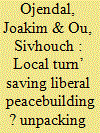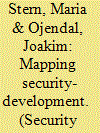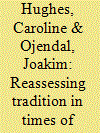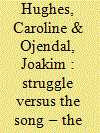|
|
|
Sort Order |
|
|
|
Items / Page
|
|
|
|
|
|
|
| Srl | Item |
| 1 |
ID:
052215


|
|
|
| 2 |
ID:
074920


|
|
|
|
|
| Publication |
2006.
|
| Summary/Abstract |
This article takes the dominant view of a top-down Khmer political culture as its point of departure and explores the extent to which the last decade's political changes have altered the socio-political landscape and triggered the growth of agency in rural areas. In particular, the reform of democratic decentralisation and its integrated 'soft' values are scrutinised in fields such as views on local governance, popular discourse on decentralisation, rural NGO activity and the gendering of politics.
|
|
|
|
|
|
|
|
|
|
|
|
|
|
|
|
| 3 |
ID:
139234


|
|
|
|
|
| Summary/Abstract |
The trajectory of the liberal peacebuilding project has encountered a fundamental critique of its failure to deliver the expected sustainable peace. This paper questions the approach with which it has been, and largely still is, pursued. We reflect on a more communicative, nuanced, contextual and time-bound approach. In particular, we identify the failure of the liberal peace to localise peace and to make it a part of everyday life in Cambodia. Nevertheless, we claim that liberal peace has unintentionally created space for progress, while a ‘local turn’ has proved significant. We demonstrate empirically that certain forms of local and everyday peace have emerged for the ‘wrong’ reason, and may evolve further. Hence, a local peace has gradually sunk in, although its liberal foundations remain virtual.
|
|
|
|
|
|
|
|
|
|
|
|
|
|
|
|
| 4 |
ID:
104028


|
|
|
|
|
| Publication |
2011.
|
| Summary/Abstract |
The critical and considered response by Simon Reid-Henry (2011) reinforces our sense that the widespread attention being given to the 'security-development nexus' in the realm of policy warrants careful and critical scrutiny. Perhaps most significantly, Reid-Henry's review article draws attention to the need to engage in the difficult - and often overlooked - questions of methodology: how can we creatively study the different ways in which the 'nexus' is being practised, negotiated and resisted in distinct sites - and to what effect? His comments therefore add much to our collective (yet necessarily disparate) efforts to develop an array of creative methodologies for the study of the 'nexus'. Continuing the spirit of constructive critique, we engage with some of his main lines of argument. It is vital, we believe, to remember that there are many ways of exploring the politics of security-development, each requiring different road maps. Furthermore, as Véronique Pin-Fat reminds us, even the astute and committed pursuance of any given map may blind us to 'finding' what we are looking for.
|
|
|
|
|
|
|
|
|
|
|
|
|
|
|
|
| 5 |
ID:
094754


|
|
|
|
|
| Publication |
2010.
|
| Summary/Abstract |
It is now beyond doubt that attention to the 'security-development nexus' has become commonplace in national and global policymaking. However, how 'the nexus' is differently imbued with meaning and ultimately employed remains underexplored. In this article, we suggest a possible framework for mapping the multiple understandings that underlie specific articulations of 'the nexus' in order to reveal the ways in which meaning may shift in different (yet seemingly similar) discourses. To this end, we draw upon familiar stories about 'development' and 'security', and we offer a brief reading of ways in which 'the nexus' is articulated in policy texts. Ultimately, this framework may hint at what such articulations may imply for the policy agenda.
|
|
|
|
|
|
|
|
|
|
|
|
|
|
|
|
| 6 |
ID:
074918


|
|
|
|
|
| Publication |
2006.
|
| Summary/Abstract |
This collection of articles focuses on the interrelationship of tradition and change in the Cambodian context. In doing so, it seeks to achieve a number of objectives: first, to contribute to the debate over the role of 'culture' in political life in Cambodia; second, to challenge some of the preconceptions about the nature of 'culture' in general, and Cambodian culture in particular, upon which that debate has been based; and third, to achieve these first two aims by bringing together in productive dialogue recent speculations on Cambodia in the disciplines of political science and anthropology. As such, the symposium seeks to reflect on the relationship between culture and politics; the implications of different framings of this relationship for the politics of contemporary international engagement with Cambodia; and the implications of these for the disciplinary lenses commonly adopted by political scientists and anthropologists.
|
|
|
|
|
|
|
|
|
|
|
|
|
|
|
|
| 7 |
ID:
139227


|
|
|
|
|
| Summary/Abstract |
This introduction presents how views on ‘the local turn’ in peacebuilding has evolved into a significant discourse. Currently, it has ‘its moment’ and is widely used by theorists and practitioners alike, by normative localists as well as by liberal policy-makers, albeit for different reasons and with differing intensions. We suggest that international interventions for the purpose of peacebuilding cannot be justified a priori, but requires resonance at the ‘receiving end’, which the local dimension potentially offers. It is however an elusive and contested concept that requires thorough scrutiny and critical assessment. Here a collection of conceptual and empirical articles is contextualised and introduced, painting a broad state-of-the-art of the pros and cons of the local turn.
|
|
|
|
|
|
|
|
|
|
|
|
|
|
|
|
|
|
|
|
|